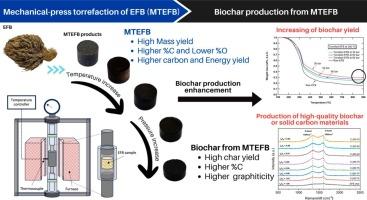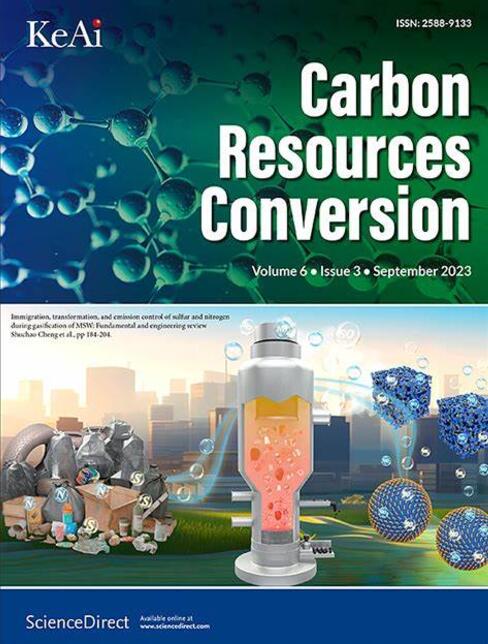Parametric study on mechanical-press torrefaction of palm oil empty fruit bunch for production of biochar
IF 7.5
3区 环境科学与生态学
Q2 ENERGY & FUELS
引用次数: 0
Abstract
This study investigated the impact of varying temperatures and pressures during torrefaction under mechanical compression on the mass yield and chemical properties of torrefied empty fruit bunch (MTEFB). It also examined how these factors influenced the biochar derived from MTEFB. Experiments were conducted at temperatures ranging from 240 °C to 300 °C and mechanical pressures of 25, 50, and 75 MPa. The results indicated that at all temperatures above 280 °C, mass yields were significantly reduced, and higher mechanical pressures further accelerated thermal degradation. FTIR analysis revealed structural modifications, including dehydration, decarboxylation, and demethylation, particularly at elevated pressures. Elemental analysis showed an increase in carbon content to 55.68 % when MTEFB was prepared at 300 °C and 75 MPa. The HHV reached 23.11 MJ/kg, indicating improved energy yield. The proximate analysis demonstrated an increase in fixed carbon to 26.32 %, highlighting the influence of temperature and pressure on biochar characteristics. Further carbonization at 600 °C of MTEFB, which was prepared under mechanical-press torrefaction conditions at 300 °C with 75 MPa, produced biochar with enhanced yield and a more graphitic structure. The combination of mechanical-press torrefaction and subsequent carbonization presented a promising pathway for producing high-quality biochar and other solid carbon materials.

棕榈油空果串机械压榨焙烧生产生物炭的参数研究
研究了机械压缩下不同温度和压力对碳化空果串(MTEFB)质量产率和化学性质的影响。它还研究了这些因素如何影响从MTEFB衍生的生物炭。实验温度范围为240 °C至300 °C,机械压力为25、50和75 MPa。结果表明,在高于280 °C的温度下,质量产率显著降低,更高的机械压力进一步加速了热降解。FTIR分析揭示了结构变化,包括脱水、脱羧和去甲基化,特别是在高压下。元素分析表明,在300 °C和75 MPa条件下制备MTEFB时,碳含量提高到55.68 %。HHV达到23.11 MJ/kg,表明能量产量有所提高。近似分析表明,固定碳增加到26.32 %,突出了温度和压力对生物炭特性的影响。在300 °C、75 MPa的机械压下焙烧条件下制备的MTEFB,在600 °C下进一步碳化,得到的生物炭产率提高,结构更加石墨化。机械加压焙烧和后续炭化相结合是生产高质量生物炭和其他固体碳材料的一条很有前途的途径。
本文章由计算机程序翻译,如有差异,请以英文原文为准。
求助全文
约1分钟内获得全文
求助全文
来源期刊

Carbon Resources Conversion
Materials Science-Materials Science (miscellaneous)
CiteScore
9.90
自引率
11.70%
发文量
36
审稿时长
10 weeks
期刊介绍:
Carbon Resources Conversion (CRC) publishes fundamental studies and industrial developments regarding relevant technologies aiming for the clean, efficient, value-added, and low-carbon utilization of carbon-containing resources as fuel for energy and as feedstock for materials or chemicals from, for example, fossil fuels, biomass, syngas, CO2, hydrocarbons, and organic wastes via physical, thermal, chemical, biological, and other technical methods. CRC also publishes scientific and engineering studies on resource characterization and pretreatment, carbon material innovation and production, clean technologies related to carbon resource conversion and utilization, and various process-supporting technologies, including on-line or off-line measurement and monitoring, modeling, simulations focused on safe and efficient process operation and control, and process and equipment optimization.
 求助内容:
求助内容: 应助结果提醒方式:
应助结果提醒方式:


